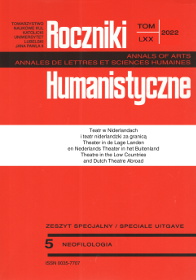Rozmowa to gra. Rola kontekstu społecznego w komunikacji
Abstrakt
Niniejszy artykuł poświęcony jest zagadnieniu możliwości badania językowej interakcji komunikacyjnej jako gry komunikacyjnej. Interakcja ta, postrzegana jako gra komunikacyjna, składa się z jawnych wypowiedzi i argumentów, a także ukrytych założeń. Celem projektu jest zbadanie sytuacji, w jakich odbywa się interakcja językowa, jej społecznego i kulturowego kontekstu. Kontekst rozumiany jest jako ukryte założenia, związane z sytuacją komunikacyjną i towarzyszącymi jej okolicznościami społecznymi i kulturowymi. Opierając się na teoriach Jürgena Habermasa, który dokonał rozróżnienia między działaniami racjonalnymi i strategicznie racjonalnymi, autorka dowodzi, że kontekst dyskusji ma krytycznie istotne znaczenie dla osiągnięcia celu komunikacyjnego. Po krótkim omówieniu dydaktyki języków obcych w Niderlandach w przeszłości, ze szczególnym uwzględnieniem myśli Jana Amosa Komeńskiego, omawia zmiany w nauczaniu w tym obszarze w ostatnich czasach.
Bibliografia
Boon, Ton den, en Ruud Hendrickx. Van Dale Groot Woordenboek van de Nederlandse taal. 15e herziene editie, Van Dale Uitgevers, 2015.
Chomsky, Noam. Syntactic Structures. 1957. De Gruyter Mouton, 2002.
Condor, Susan, en Charles Antaki. ‘Social Cognition and Discourse’. Discourse as Structure and Process. Discourse Studies: A Multidisciplinary Introduction, geredigeerd door Teun van Dijk, e-book ed., Sage, 1997, www.doi.org/10.4135/9781446221884.n12.
Dijk, Theun van. ‘The Study of Discourse’. Discourse as Structure and Process. Discourse Studies: A Multidisciplinary Introduction, geredigeerd door Teun van Dijk, e-book ed., Sage, 1997, www.doi.org/10.4135/9781446221884.n1.
Habermas, Jürgen. The Theory of Communicative Action, part 1. Polity Press (oorspronkelijk Theorie des kommunikativen Handelns, 1981), 2004.
Helsloot, Pieter N. ‘De Nutsbeweging’. Om het algemeen volksgeluk: Twee eeuwen particulier initiatief 1784-1984: Gedenkboek ter gelegenheid van het tweehonderdjarig bestaan van de Maatschappij tot Nut van ’t Algemeen, geredigeerd door Wijnand W. Mijnhardt en Antonius J. Wichers, Maatschappij tot Nut van ’t Algemeen, 1984, pp. 1-86.
Hemrica, Jantine. Kind-zijn. Tussen opvoeding en recht. Garant, 2004.
Huizinga, Johan. Homo Ludens. Amsterdam UP, 2008.
Hulshof, Hans, e.a. Geschiedenis van het vreemdetalen-onderwijs in Nederland. Passage, 2015.
Komenský, Jan Amos. Didaktika velká (Didactica magna). Komenium, 1948.
Komenský, Jan Amos. Informatorium školy mateřské. Fr. Urbánek, 1884.
Komenský, Jan Amos. Orbis sensualis pictus. Fr. Strnad, 1942. Růžový palouček 8.
Kwakernaak, Erik. Didactiek van het vreemdetalenonderwijs. Coutinho, 2019.
Lepková, Kateřina, e.a. ‘Constructing Czechoslovakia: The meaning of “intelligence” in Czechoslovak educational discourse, 1900-1939’. Journal of the History of the Behavioral Sciences, vol. 41, nr. 1, 2005, pp. 25-41.
Stalnaker, Robert. Context and content. Essays on intentionality in speech and thought. Oxford University Press, 1999.
Vreeke, Gert-Jan. ‘Gedreven scepticisme. Heytingiaanse opvoedingsfilosofie’. Pedagogiek, vol. 26, nr. 1, 2006, pp. 100-112.
Copyright (c) 2022 Roczniki Humanistyczne

Utwór dostępny jest na licencji Creative Commons Uznanie autorstwa – Użycie niekomercyjne – Bez utworów zależnych 4.0 Międzynarodowe.





